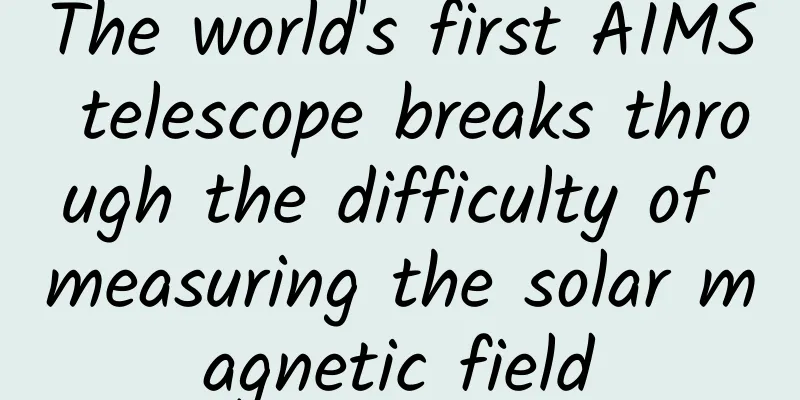The world's first AIMS telescope breaks through the difficulty of measuring the solar magnetic field

|
Reporters learned from the Qinghai Lenghu Astronomical Observatory that the world's first "mid-infrared observation system for precise measurement of the solar magnetic field" (AIMS telescope for short) has achieved its core scientific goal - improving the accuracy of vector magnetic field measurements by an order of magnitude, and realizing the leap from "indirect measurement" to "direct measurement" of the solar magnetic field. The AIMS telescope is a major instrument special project (recommended by ministries and commissions) supported by the National Natural Science Foundation of China. It is located on the D platform of Saishiteng Mountain in Lenghu Town, Mangya City, Haixi Mongolian and Tibetan Autonomous Prefecture, Qinghai Province, with an average altitude of about 4,000 meters. It is understood that after more than five months of preliminary debugging and observation, the current technical indicators of the telescope have met the requirements of the task book and entered the acceptance preparation stage. Wang Dongguang, chief engineer of the Huairou Solar Observatory of the National Astronomical Observatory of the Chinese Academy of Sciences, introduced that scientific data analysis showed that the AIMS telescope has carried out precise measurements of the solar vector magnetic field with an accuracy of better than 10 gauss for the first time. "This means that the AIMS telescope has achieved the expected goal of directly measuring the Zeeman gap in the mid-infrared band to obtain the solar magnetic field strength using an ultra-narrowband Fourier spectrometer, breaking through the bottleneck problem in the century-long history of solar magnetic field measurement and achieving the leap from 'indirect measurement' to 'direct measurement' of the solar magnetic field," said Wang Dongguang. "The Zeeman gap is proportional to the square of the wavelength. Before the AIMS telescope, the solar magnetic field was mostly observed in the visible or near-infrared bands. Because the gap was very small, it was difficult for the observation instruments to distinguish. The AIMS telescope operates at a wavelength of 12.3 microns. Under the same magnetic field strength, the Zeeman gap increases by several hundred times, making 'direct measurement' possible." This is the main structure of AIMS photographed on April 8, 2023. Photo by Xinhua News Agency reporter Gu Ling The AIMS telescope is the world's first equipment dedicated to mid-infrared solar magnetic field observations, and will unveil the mystery of the sun in the mid-infrared band. "Through optical design to eliminate stray light and vacuum cooling technologies, we have solved the problems faced by infrared solar observations in this band, such as high environmental background noise and reduced detector performance." Feng Zhiwei, senior engineer of the National Astronomical Observatory of the Chinese Academy of Sciences, introduced that the infrared imaging terminal consists of three systems: infrared optics, focal plane array detectors, and vacuum cooling. All components, including the detector chip, are domestically produced. The terminal system is mainly used for monochromatic imaging observations of the sun in the 8 to 10 micron band, so as to study the material and energy transfer mechanism during the violent solar eruptions. In addition, the AIMS telescope has also achieved breakthroughs in technologies and methods related to mid-infrared solar magnetic field measurements, and realized the first system-level polarization performance compensation and calibration of a mid-infrared solar telescope in China. "The telescope system is the first to use an off-axis optical system design in Chinese astronomical observations. In addition to the 8 to 10 micron infrared monochromatic image, the focal plane scientific instrument is also equipped with an internationally leading high spectral resolution infrared imaging spectrometer and polarization measurement system." Wang Dongguang introduced that the development of the AIMS telescope, in addition to playing a leading role in the precise measurement of the solar magnetic field, can also find new scientific opportunities in the mid-infrared band, which is currently little known. According to reports, the AIMS telescope aims to provide more accurate solar magnetic field and mid-infrared imaging and spectral observation data to study the generation, accumulation, triggering and energy release mechanisms of magnetic energy in solar magnetic field activities, and to study the transfer process of matter and energy during violent eruptions such as flares, and is expected to achieve breakthrough results in solar physics research. Planning: Liu Xinhui Reporter: Gu Ling Editors: Chong Dahai, Zhu Shun Produced jointly by Xinhua News Agency Domestic Department and Xinhua News Agency Qinghai Branch Produced by Star Studio |
<<: The more "mud" you rub off during the shower, the cleaner you will be. Is this true?
>>: Pilots' anti-gravity suits were learned from giraffes?
Recommend
The fruit I used to play house with when I was a kid turned out to be a great anti-cancer drug
Every autumn, you can see a lot of wild grasses w...
The efficacy and function of roadside ginger
Do you know what roadside ginger is? If you know,...
The efficacy and function of Lespedeza slendersii
Lespedeza serrata is a kind of Chinese herbal med...
The efficacy and function of paraffin red
As people's research on traditional Chinese m...
The efficacy and role of abortion-preserving drugs
Pregnancy-stabilizing drugs are one of the common...
[Creative Cultivation Program] What efforts has mankind made to search for habitable planets outside the Earth?
Author: Wang Zifeng Review: Liu Qian On June 20, ...
What are the effects and functions of Fritillaria?
What are the effects and functions of Fritillaria...
What are the medicinal values of Danshen?
Salvia miltiorrhiza is a precious Chinese medicin...
Effects of Polygonatum odoratum
Chinese herbal medicine is very common nowadays. ...
Why do vinegar and baking soda clean stains?
I don't know when the seasonings on the kitch...
Drinking water with your butt? I didn’t expect you to be such a beetle…|Nature Trumpet
Welcome to the Nature Trumpet column. In the past...
The efficacy and function of Zanthoxylum bungeanum peel
As people's living standards continue to impr...
The efficacy and function of moving the steamer
Bandaozeng is a kind of medicinal material. If we...
The efficacy and function of sycamore
Paulownia is a medicinal herb that is quite commo...
The difference between the efficacy and function of licorice and licorice
Raw licorice and roasted licorice are both tradit...

![[Jiang Xiaoxi talks about Poyang Lake] The speed of "changing face" is amazing! Why does the lake water turn yellow in autumn and winter?](/upload/images/67efff7c75055.webp)







